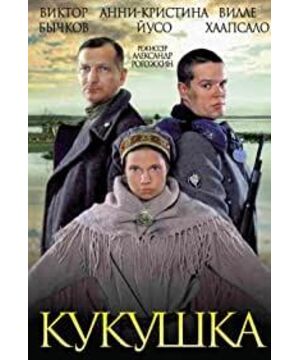This short story begins when World War II is about to end, the German army has begun to disintegrate, and the Soviet army has begun to show signs of internal disintegration. A German deserter was pinned to a rock in a Nordic forest by a Nazi squad—his right ankle was chained to one end with a rivet that was smashed into the solid rock. The dilemma faced by this lone warrior at the time was a bit like the captured Prometheus in Greek mythology (which seems to symbolize Germany being nailed to the pillar of human shame, but the Russian director's attitude towards history and Germany will not be so loose, This soldier is a Finnish university student, he does not represent pure Germany, he is just an ordinary deserter who is tired of war and longs for freedom).
Ivan, a Soviet soldier, was an outcast junior officer. On the way to the rear, his jeep was hit by a German plane. The soldier who was escorting him was killed and he was seriously injured. Annie, a Lapland (it should be a nomadic people similar to the Oroqen) who lives alone in the forest, found him and dragged him back to the wooden house for treatment. At this time, the German soldier came to Anne's wooden house after using fire and water to break free of the rock. So, an interesting and bizarre story happened between these three men and women with different languages and different personalities...
This is obviously another fable for reflecting on the war. The three people represent three positions. An isolated outsider. One of the most critical figures is the Lapland woman Anne, also known as the "cuckoo". It is not so much that she is a bystander of this war, it is better to say that she ignores the existence of the war at all. Her husband left her four years ago after joining the war. She lives alone in a remote forest with only one dog and three dogs. Reindeer, humble cabins, big forest and a lake. The right and wrong of war has no meaning in her eyes. She survives by instinct and witchcraft, and has the original simple world view of mankind. She not only saves the dying and the wounded generously, but also rejoices in a timely manner without hesitation. When the men who have been favored by her want to leave her, she will never stop her. She is like the caretaker of the forest, a nomad of nature. In contrast, the two soldiers were rather insignificant: the German soldiers joined the war in desperation and wanted to return to the university life before the war, while the Soviet officer was poisoned even more deeply, and he was a standard Soviet veteran full of class struggle cells. revolution. When the two left the "cuckoo" forest (pure and natural), they took off the uniforms that marked their military identities and put on animal skins with vague identities, which looked like they had completed some kind of baptism.
The most prominent idea of this story is to get rid of the judgment of right and wrong made on both sides of the war in the general sense, and it is not just a cheap expression of the theme of humanity on the battlefield. It depicts and resolves the grievances in a docile manner, and at the same time does not interfere with the audience's imagination of the subsequent story - what happened to the two soldiers later, the film does not make any explanation. Technically, the film technique is skillful and simple, the lens is precise and simple, and there is no lack of black humor in it. It is a Russian film worth watching.
View more about Kukushka reviews






